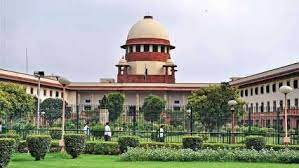NEWS
SC urges NCLT, NCLAT to adhere to IBC timelines
Supreme Court also says resolution plan submitted to NCLT by lenders cannot be modified or withdrawn by resolution applicant.
Supreme Court also says resolution plan submitted to NCLT by lenders cannot be modified or withdrawn by resolution applicant.

The Supreme Court has urged the insolvency courts to strictly adhere to the timelines stipulated under the Insolvency and Bankruptcy Code (IBC) and clear pending resolution plans within the 330-day deadline.
The two insolvency courts are the National Company Law Tribunal (NCLT) and the National Company Law Appellate Tribunal (NCLAT).
A bench headed by Justice DY Chandrachud said judicial delays had led to the failure of other recovery mechanisms in India and the same fate should not fall on the IBC. Inordinate delays cause commercial uncertainty, degradation in the value of the corporate debtor and makes the insolvency process inefficient and expensive.
Essar Steel and Bhushan Steel are some of the large corporate cases that took close to three years to resolve.
The court further said that once the committee of creditors (CoC) submits a resolution plan for stressed assets under IBC, it cannot be modified or withdrawn by the resolution applicant.
"We hold that the existing insolvency framework in India provides no scope for effecting further modifications or withdrawals of CoC-approved Resolution Plans, at the behest of the successful Resolution Applicant, once the plan has been submitted to the Adjudicating Authority," the judgment stated.
"A Resolution Applicant, after obtaining the financial information of the Corporate Debtor through the informational utilities and perusing the IM, is assumed to have analysed the risks in the business of the Corporate Debtor and submitted a considered proposal. A submitted Resolution Plan is binding and irrevocable as between the CoC and the successful Resolution Applicant in terms of the provisions of the IBC and the CIRP Regulations."
The apex court was hearing a case filed by Ebix Singapore PTE against the CoC of Educomp Solutions who wanted to change the resolution plan after it got the approvals.
The court said that the IBC was introduced as a watershed moment for insolvency law in India that consolidated processes under several disparate statutes such as the 2013 Act, SICA, SARFAESI, Recovery of Debts Act, Presidency Towns Insolvency Act 1909 and the Provincial Insolvency Act 1920, into a single code. A comprehensive and time-bound framework was introduced with smooth transitions between reorganisation and liquidation, with an aim to inter alia maximise the value of assets of all persons and balance the interest of all stakeholders.
The NCLT and the NCLAT should abide by the deadline prescribed by the legislature, the bench held.
"We urge the NCLT and NCLAT to be sensitive to the effect of such delays on the insolvency resolution process and be cognizant that adjournments hamper the efficacy of the judicial process. The NCLT and the NCLAT should endeavor, on a best effort basis, to strictly adhere to the timelines stipulated under the IBC and clear pending resolution plans forthwith. Judicial delay was one of the major reasons for the failure of the insolvency regime that was in effect prior to the IBC. We cannot let the present insolvency regime meet the same fate," the judgment said.
The judgment was delivered on an appeal from a NCLAT judgment of July 2020. The NCLT had allowed the withdrawal application filed by Ebix under Section 60(5) of the IBC to withdraw its Resolution Plan submitted for Educomp Solutions, the debt-ridden digital education company, after being selected by the 75.36 per cent members of the CoC. This was challenged by the Singapore company in the apex court.
The NCLAT had held that the application to withdraw from the Resolution Plan could not have been allowed since: (i) it was barred by res judicata; and (ii) the NCLT does not have jurisdiction to permit such a withdrawal.
This reasoning was under challenge in the present case.
The SC held that the Adjudicating Authority lacks the authority to allow the withdrawal or modification of the Resolution Plan by a successful Resolution Applicant or to give effect to any such clauses in the Resolution Plan.
"Adjudicating Authority under Section 31(2) of the IBC can only examine the validity of the plan on the anvil of the grounds stipulated in Section 30 (2) and either approve or reject the plan. The Adjudicating Authority cannot compel a CoC to negotiate further with a successful Resolution Applicant," the top court ruled.
